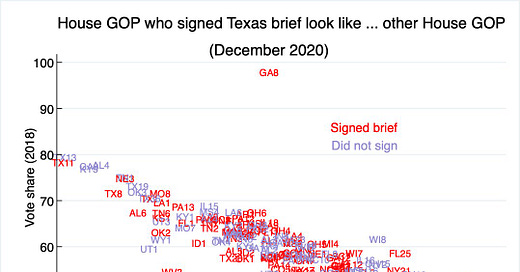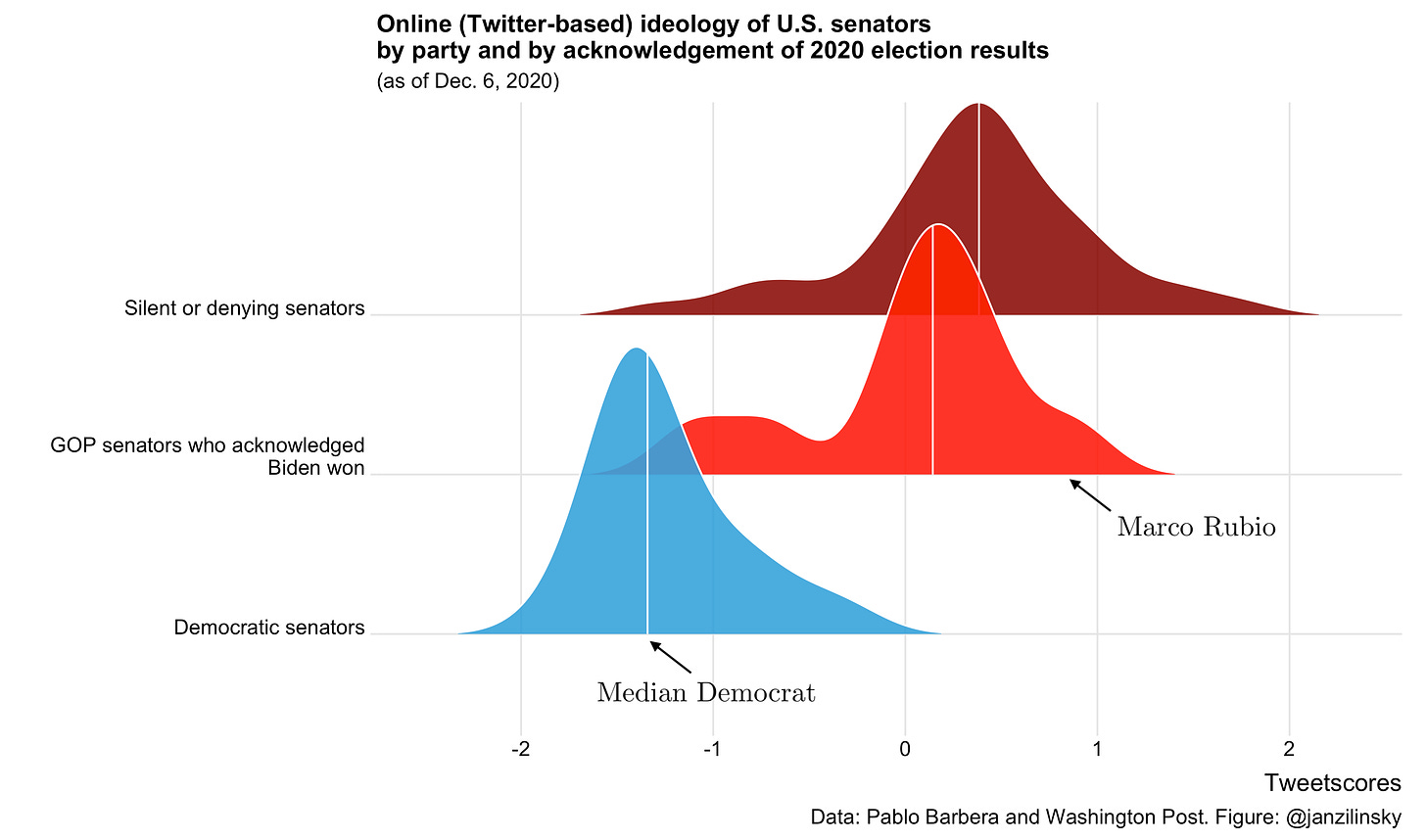These data are an ominous warning about the future of American democracy 📊 December 13, 2020
Returning Republican lawmakers from safer districts were more likely to support Ken Paxton's bogus SCOTUS case
Thanks as ever for reading my weekly data-driven newsletter on politics, polling and the news. As always, I invite you to drop me a line (or just respond to this email). Please click/tap the ❤️ under the headline if you like what you’re reading; it’s our little trick to sway Substack’s curation algorithm in our favor. If you want more content, I publish subscribers-only posts once or twice a week.
Dear reader,
What happens when our very belief for democracy becomes polarized, with one party believing in the rules of the game while the others cast them aside? I guess we’re about to find out.
With Donald Trump’s failure to steal the election via electoral, legislative or judicial nefariousness, it now is nearly certain that Joe Biden will be inaugurated as America’s 46th president on January 20th, 2021. But that’s not actually so comforting. The fact that so many Republican lawmakers — and the vast majority of GOP voters — have supported Trump’s charades prompts troubling questions for the future of our democracy.
Before reading today’s post, I want you to think about a two-part question. Can we really expect politicians to do the right thing if their voters are demanding them not to do it? And, if not, how else can we restore faith in democracy?
…
A note: With a socially-distanced Christmas around the corner for many of us, I hope you are all actively thinking of ways to add joy in your life. I put up a small Christmas tree this weekend that helped bring about some seasonal feelings. It’s a little thing, but I’d recommend it.
—Elliott
These data are an ominous warning about the future of American democracy
Returning Republican lawmakers from safer districts were more likely to support Ken Paxton's bogus SCOTUS case
Ken Paxton, Texas’s attorney general, attempted to sue the states of Georgia, Michigan, Pennsylvania, and Wisconsin in the Supreme Court last week. He claimed that the states illegally expanded vote-by-mail efforts before the election, invalidating the results of the contest by default. The remedy for this, Paxton’s case goes, is for those states’ Republican-dominated state legislatures to pick their own slates of (assumedly pro-Trump) electors to send to the Electoral College tomorrow, making Trump president.
None of Paxton’s allegations really stood up to scrutiny, and the Supreme Court tossed out the case in saying that Texas had no legal standing to lob such a claim at another state.
And while we should be happy that our judiciary is so independent from partisan politics that even Trump’s own appointees could oppose him on this and similar cases, there are still warning signs in the last week’s events. I am troubled most by the 120 House Republicans and a dozen other state attorneys general that signed on to Paxton’s lawsuit. They joined the tens of millions of Republican voters who also believe the false claims that “illegal voters” cast enough ballots to tip the election to Biden.
The willingness of the GOP to back Trump’s anti-democracy efforts is obviously concerning for the future of our country. Can we even engage in the political process when roughly 40% of voters and 30% of Congressional representatives ignore basic, confirmed facts of the election in an attempt to get their party’s candidates elected? In other words, if our belief in the rules of democracy has been mapped onto our partisanship, how do we play the game? I will return to this question later, but for now, just let it frame the rest of this short post.
Analyzing the amicus brief signators, Sarah Binder, a GWU political scientist, posted the following chart showing whether each Hosue Republican supported Paxton’s lawsuit and the electoral competitiveness of their district:
Dr Binder finds a slight relationship between how safe a lawmaker is and their willingness to sign a brief in support of the lawsuit, with Republicans from closer districts less likely to sign their names. She also finds that Republicans are less likely to signal support for Trump on the case if they’re retiring from office, which she conveys with this chart.
Charles Stweart, an MIT professor of political science and a leading scholar on election administration, showed the same relationship between a district’s vote share for Trump and its representative’s support for the Paxton case this way:
Jan Zalinsky, a NYU political science PhD student, also joined in on the chart fun, showing that GOP Senators who acknowledged Biden’s victory are more moderate than those who have been silent or denied it (according to data from Washington Post interviews last week).
To summarize, we have established two main facts. First, Republican lawmakers from safer districts are more likely to support the president’s anti-democratic antics than those from marginal ones. (Those lawmakers also happen to be more conservative.) And second, that returning members are even more likely to sign on with the president than those that are leaving, meaning we should expect this issue to continue.
So, why the pattern? Well, it’s probably just a simple political calculation. Republicans from more competitive districts have more reason to be careful incurring any political costs from siding with the president, especially on an issue as potentially unpopular as this one. Safe Republicans, on the other hand, might fear being primaried by a more Trumpist candidate in their next election. And when over four in five Republicans believe the president’s lies about the election, perceiving such a threat is electorally accurate. And that the line for returning members is higher everywhere than for retiring members might evidence some overall effects of party membership or perceived electoral threats regardless of a district’s partisanship. Outgoing members, after all, can speak their mind without fear of political retribution.
…
This brings me back to the question I asked in my introductory note. I wanted you to think about a two-pronged question: Can we really expect politicians to do the right thing if their voters are demanding them not to do it? And, if not, how else can we restore faith in democracy?
Given Republicans’ electoral incentives for throwing out democracy and fair elections in favor of power and loyalty to the president, it’s hard to answer the former question with much optimism. Far-right propaganda on social media, combined with misinformation from Fox News and other corporate news outlets, have convinced enough GOP primary voters that they have to throw out democratically-minded politicians in order to win elections. Just this weekend, Trump-aligned protestors shouted “destroy the GOP!!” at a rally in DC. That should only reinforce the extremely troubling willingness of Republican elected officials to adopt anti-democratic beliefs.
The answer to the second part of the question, then, is more complicated. How can we restore faith in democracy if one of America’s two major political parties is not likely to reverse course on their beliefs any time soon? There are many answers, and many incentives to simply answer “we’re all screwed” and move on.
One reason for hope is that voters tend to follow the lead of their party officials and adopt many of their beliefs and policy positions. If Republicans who are passionate about our norms and believe in democratic rules and fair elections can win intra-party battles for power and influence, and then convince their voters to believe in the process and play by the rules, that will be a huge step toward restoring our democracy.
…
More troubling is the second question I asked you to think about: If our belief in the rules of democracy have become a partisan issue, how do we play the game at all? The answer, as I think we’ve seen this year, is that many of our compatriots simply won’t.
In the near future, while some Republicans are trying (and, if I had to bet, largely failing) to restore their party’s trust in our constitution, the rest will continue to degrade our institutions and push us closer toward a minoritarian autocracy. In “mild” cases, that could mean Republicans suing officials of other states to try to force the Supreme Court to overturn the election for you. In more severe ones, that might entail calling election officials at home to threaten their lives. In even the worst cases, that could mean gathering arms and explosives with your Facebook friends to try to kidnap governors who belong to the other political party.
To belabor the metaphor: if our democratic norms and institutions make up a baseball field, Republicans have decided that they should be allowed to run bases without hitting balls — and if Democrats ever make it to home plate, they must have cheated somehow anyway. I don’t believe it’s imminent that they will stop, look down at the bases they are trampling, and think about all the harm they’re causing to the fans.
If our democracy is ultimately preserved in its current form, it will be by a corps of civil servants and civic-minded politicians who rise up to take the reigns of the GOP; by government regulators that act in the public’s interest against rampant misinformation on television networks and social media sites; by millions of Republican voters who reject the Trumpism of the past four years (and especially this year); by reformers who make new laws to make sure we never stray down this path again; and by many others acting in good faith to further the promise of our government.
After the events of the last few months, it is hard to see anything other than the ominous clouds that hang over our democracy — if that’s even what we have anymore, anyway.
Posts for subscribers
December 11: Trumpism is here to stay. Trump is a relatively popular conservative president, and the psychological roots of his appeal aren't going anywhere anytime soon
A reminder: it’s that time of year again! 🎄 The holiday season typically produces a big chunk (think 20%) of my yearly subscription numbers, both for premium editions and the weekly update. I would be grateful if you would consider sharing the link to this newsletter on social media, or signing up for extra posts yourself if you haven’t already. As per my normal holiday rate, new subscriptions made before January 1st, 2021 will be half-off or the entirety of the next year. Perfect for a subscription for yourself or a gift to a close friend.
What I'm Reading and Working On
I have been reading the political writings of John Dewey recently, and I find him a reasonable supporter of the role public opinion should play in our democracy. His work presents a sweet spot between the oftentimes-utopian ideals of the pollsters and the anti-democratic complaints from polling’s critics — a position similar to the one I find myself taking as I continue to make progress on my book.
For those wondering where to start, I recommend this compilation of Dewey’s works edited by Debra Morris and Ian Shapiro, published by Hackett.
Other links and recommendations:
Adam Serwer at The Atlantic writes about the emerging Republican orthodoxy that “If You Didn’t Vote for Trump, Your Vote Is Fraudulent”
Matthew Green blogs more about the connection between conservatism and anti-democratic beliefs
Thanks for reading!
Thanks for reading. I’ll be back in your inbox next Sunday. In the meantime, follow me online or reach out via email if you’d like to engage. I’d love to hear from you. If you want more content, I publish subscribers-only posts once or twice each week.
Photo contest
Lucy sends in this picture of brothers from different mothers Rocky and Eddie, who remind me of a look-alike kitten named Gigi that my family had when I was young.
For next week’s contest, send me a photo of your pet(s) to elliott[AT]gelliottmorris[DOT]com!









Elliott, I've been thinking about this sentence all week: "If our belief in the rules of democracy have become a partisan issue, how do we play the game at all?"
Another question, I've have is: If reforming/strengthening our democracy has become a partisan issue, how do we save democracy?
The Paxton lawsuit set off alarm bells among my Republican/conservatives friends. Suddenly reforming the Electoral College isn't that crazy. The clear answer to me is getting rid of the Electoral College all together, an idea that they are resistant to. Joe Biden won the Electoral College by winning three states: WI, GA, and AZ. Biden won the Electoral College by 43,809 votes, but Biden won the popular vote by 7,058,909 votes and received 51.3% (and an majority) of the popular vote. His popular vote margin is 4.4%. That Electoral College Popular Vote split is pretty outrageous.
20,682 (WI) +10,457 (AZ) +12,670 (GA) = 43,809
81,281,502- 74,222,593 = 7,058,909
https://cookpolitical.com/2020-national-popular-vote-tracker
Overall, the fact that I'm having these conversations with my Republican/conservatives friends makes me hopeful.
-Elliot